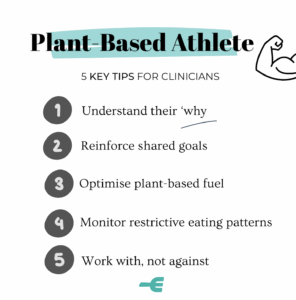What Fuels Their Fire: Aligning Plant-Based Nutrition with Athlete Identity
Working with plant-based athletes isn’t just about food – it’s about values, identity, and purpose.
Whether it’s ethical beliefs, cultural traditions, or a deep commitment to health, plant-based diets are often more than just “what’s on the plate.” For many athletes, their food choices are tightly woven into how they see themselves – as disciplined, driven, health-conscious humans doing right by their bodies and the planet.
As dietitians, this means one thing: connection before correction.
If we jump straight in with a plan that contradicts their “why,” we risk losing more than just buy-in, we lose trust.
So instead of viewing a plant-based diet as a challenge, we can use it as a conversation starter and an opportunity to build connection and collaboration.
Ask first: What’s Behind the Plate?
Before diving into meal plans or nutrition frameworks, start with curiosity. A few open-ended questions can completely shift the tone of a conversation:
- “What led you to follow a plant-based diet?”
- “What does eating this way mean to you?”
- Are there particular values or outcomes that matter most in this approach?”
This helps you uncover the athlete’s core values – whether it’s sustainability, animal welfare, long-term health, body image, or performance, which can then guide how you shape and deliver your nutrition advice in a way that truly resonates.
Speak their Language: Shared Goals First
Plant-based athletes are often focused, values-led and intentional in their decisions. Your role is to support, not challenge, those traits.
Rather than questioning their food choices, highlight where your goals and theirs intersect. That might mean saying:
“Let’s explore a calcium strategy that supports your bone health and training volume, while staying within your plant-based framework”
Instead of:
“You may need to add dairy to meet your calcium needs”
Small language shifts like this reinforce collaboration and respect their autonomy, helping build long-term buy-in.
Approach with Curiosity and Care
While plant-based eating is not inherently restricted, it can at times be used to justify under-fuelling, rigid food behaviours or social avoidance.
If you observe patterns such as inflexibility around food, social withdrawal, or signs of low energy availability, it’s important to explore these with care and curiosity rather than assumption.
Consider gently assessing:
- Flexibility: Is the athlete able to adapt their meals or eating schedule as needed?
- Energy adequacy: Are they consistently meeting their nutritional requirements relative to their training load?
- Emotional response: Does eating, or specific food choice, provoke stress, guilt, or anxiety?
Want to build your confidence in working with plant-based athletes?
Supporting plant-based athletes goes beyond just knowing what to recommend – it’s about understanding the why behind their choices and developing strategies that honor both their values and performance goals.
We dive deeper into these strategies and more in our course: Fuelled by Plants: Mastering Nutrition for Plant-Based Athletes.




